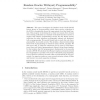Free Online Productivity Tools
i2Speak
i2Symbol
i2OCR
iTex2Img
iWeb2Print
iWeb2Shot
i2Type
iPdf2Split
iPdf2Merge
i2Bopomofo
i2Arabic
i2Style
i2Image
i2PDF
iLatex2Rtf
Sci2ools
140
Voted
ASIACRYPT
2010
Springer
2010
Springer
Random Oracles with(out) Programmability
This paper investigates the Random Oracle Model (ROM) feature known as programmability, which allows security reductions in the ROM to dynamically choose the range points of an ideal hash function. This property is interesting for at least two reasons: first, because of its seeming artificiality (no standard model hash function is known to support such adaptive programming); second, the only known security reductions for many important cryptographic schemes rely fundamentally on programming. We provide formal tools to study the role of programmability in provable security. This includes a framework describing three levels of programming in reductions (none, limited, and full). We then prove that no black-box reductions can be given for FDH signatures when only limited programming is allowed, giving formal support for the intuition that full programming is fundamental to the provable security of FDH. We also show that Shoup's trapdoor-permutation-based key-encapsulation is provably...
| Added | 10 Feb 2011 |
| Updated | 10 Feb 2011 |
| Type | Journal |
| Year | 2010 |
| Where | ASIACRYPT |
| Authors | Marc Fischlin, Anja Lehmann, Thomas Ristenpart, Thomas Shrimpton, Martijn Stam, Stefano Tessaro |
Comments (0)

